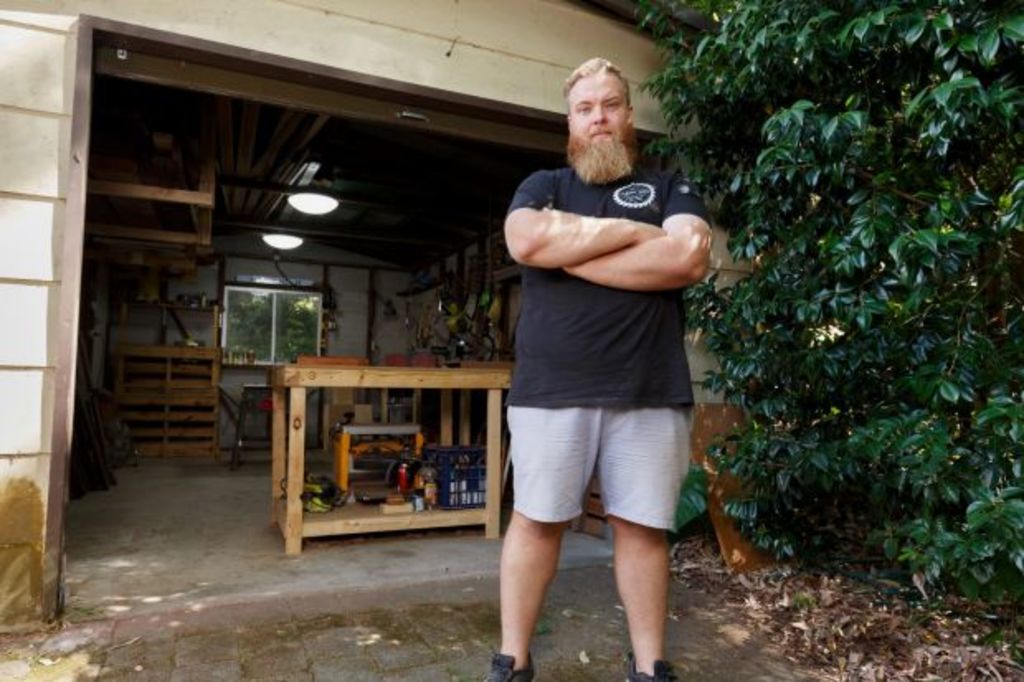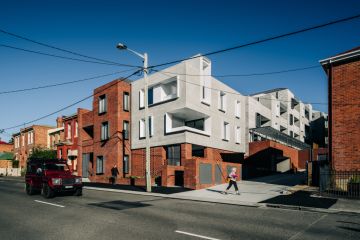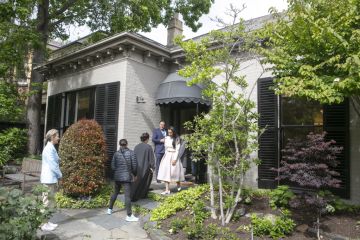From attics to paddocks: If you need extra space just rent it

Need more room to store your stuff, work on a hobby or park your caravan? Before you move house, ask a neighbour.
That’s what Pete Sutherland did when he was looking for extra space to set up Common Wood, his fledgling woodworking business.
When he made the decision to transition from full-time landscaping work to spend more time creating reclaimed timber furniture and homewares, he knew he needed more space than his two-bedroom apartment could offer.
“I was working out of the back of my mum’s house, which wasn’t exactly ideal,” he said. “I had a shed where I could keep everything but I had to pack everything down and clean everything up every time.”
The prospect of moving to a freestanding house with a garage was beyond his budget, and renting a commercial property was even more expensive and restrictive.
When he came across a nearby garage for rent on Gumtree, it turned out to be the most affordable and convenient option.
“No-one had been in the garage for about three years and it was just used as storage, literally full to the gills,” he said. “The deal was I’d clear everything out, which probably took about three or four days.”
Mr Sutherland says having an affordable space to practise his craft has allowed his business to grow.
“It makes a huge difference having 24-hour access to your own space,” he said. “I can come here after work, and in a few hours get four of five small pieces done.”
The arrangement also suits the landlord, who isn’t bothered by the occasional sound of power saws and appreciates the company. “She likes having me around because it’s a bit of extra security.”
Why renting space from neighbours makes sense
In our pricey capital cities, the rise in apartment living coupled with declining housing affordability is creating a market for spare space.
With creative people seeking access to cheap workspaces, homeowners are able to earn extra income from under-utilised assets, helping reduce the impact of sky-high mortgage repayments.
While co-working spaces can provide hotdesk or workbench arrangements, the flexibility, privacy and value of a privately rented workspace is undeniable.
And with legendary tales of multibillion-dollar companies founded in garages as inspiration, it seems the sharing economy is breaking down barriers young people face when turning a creative hobby into a career.
What other parts of a property can you rent?
For car, boat or trailer owners looking for parking in Sydney, there are more than 80 parking spots and garages advertised for rent on Domain, mostly centred in Sydney’s CBD and inner suburbs, where free street parking is virtually non-existent and commercial car parks are expensive.

This lock-up garage in a Bellevue Hill apartment complex is available for $75 per week.
The phenomenon isn’t limited to capital cities, with a garage on a vacant block in Armidale on offer for $50 per week. The owner of this vacant lot with a small shed in Tullah in Tasmania even suggests renters could use it as a place to plant a vegie patch.
While Airbnb is well-known for allowing homeowners to rent a spare bedroom to short-term guests, other lesser known peer-to-peer rental platforms are on the rise.
Spacer offers storage cages, attics, basements and backyards for lease, while subsidiary Parkhound allows users to rent garages and parking spots on a daily or monthly basis. The two platforms have more than 100,000 members.
Rural properties can even become Instagram-worthy wedding venues, with online platform WedShed offering barns, paddocks, warehouses and galleries for ceremonies and receptions.

Fancy a rural wedding? You can rent a field at this farm near Canberra for $880. Photo: WedShed
What are the risks of peer-to-peer property rental?
Property lawyer and Real Estate Escapes author Tim O’Dwyer says homeowners and tenants should clearly establish which part of the property is being rented in a tenancy agreement, with ground rules for the use of any common areas.
But he said even informal arrangements were subject to the tenancy laws of each state.
“In every situation, if someone rents any part of their house out for money, even if you put nothing in writing, it’s deemed to be a tenancy with the obligations and duties of landlords and tenants,” he said.

Both tenants and landlords should formalise the lease in a tenancy agreement. Photo: Jim Rice
For Mr Sutherland, establishing a formal arrangement was essential. “I signed a rental agreement with the landlord,” he said. “She’s a real estate agent by trade so she wanted to cover both of us.”
Mr O’Dwyer recommends both landlords and tenants take out insurance relevant to their situation, and said owners should ensure the arrangement abides by local council regulations.
“If it’s a non-residential purpose, the property may not be zoned for that use,” he said. “A lot of people get away with it until the neighbours start complaining to the council.”
Homeowners are also liable for income tax on any rent they receive, and when it comes time to sell the home, they may have capital gains tax obligations based on the proportion of the property rented and the length of time, even if it’s their principal place of residence.
We recommend
States
Capital Cities
Capital Cities - Rentals
Popular Areas
Allhomes
More







